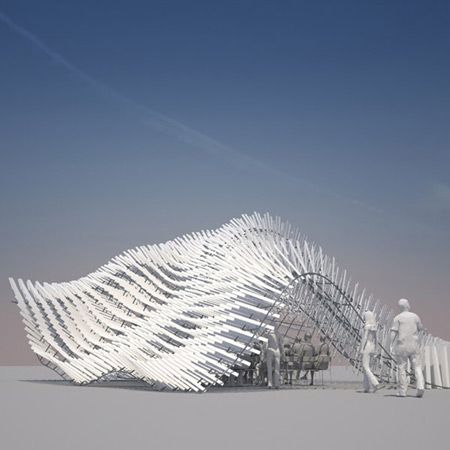Los Angeles architects Stefan Rutzinger and Kristina Schinegger have designed Synaesthetic Filter, a proposed mobile pavilion for experimental music that can change shape to alter acoustic qualities during a performance.
The demountable pavilion can be dismantled for transport and assembled in public interior spaces.
Rotating acoustic elements open and close the pavilion and produce changing patterns across the surface.
Below is some more information from Stefan Rutzinger and Kristina Schinegger:
--
Synaesthetic filter - a mobile pavilion for experimental music
Synaesthetic filter is a mobile instrument for experimental music that can stage performances from scenic plays to sound installations and is supposed to be temporarily assembled in public interior spaces.
The pavilion acts like a visual and acoustic filter that allows a flexible positioning of the musicians and audience, and a playful integration of its surroundings. Through pivotable acoustic elements the pavilion can be closed or opened to synchronize the changing visual, spatial and acoustic qualities of the space during performances.
The acoustic panels are arrayed along a surface following its normal tangents and producing a seemingly irregular pattern that transforms when the panels are rotated.
The changing patterns refer to a theme profound to Architecture as well as to Music - rule and variation. Like the sounds that emerge from it, the pavilion produces no form but a flickering presence. It does not create an enclosure to enter but a synaesthetic experience you are immersed in.
The pavilion’s main structure is an orthogonal wireframe of aluminium tubes that are curved in only one direction to simplify construction. Spikes are welded onto the bent tubes at a constant angle (30 degrees) which functions as a rotation axis for the pivot-able acoustic elements.
These elements (1900 pieces) consist of C-shaped aluminium profiles filled with reflecting or absorbing materials. In the diagonal direction they are connected through steel ropes. Servo-motors at one end of the ropes allow to synchronically rotate the elements to open or close the space visually and modify its acoustic qualities.
The pavilion (10.00 x 12.00 x 5.00 meters) can be completely dismantled for transport. To ease assembly the structure is divided into six parts that can be pre-assembled on the ground and then be put together through interlocking joints. The acoustic elements are pre-assembled like rope ladders. When fixed onto the pins they adjust themselves into their accurate positions.
The project was a competition entry for “Ohrenstrand mobil 2008” and won one of the recognition awards for “Experimental Tendencies 2008” in Austria.
Links to the project:
http://ohrenstrand.de/Teilnehmer08/Flimmernde.pdf
www.orte-noe.at/html/foerderpreis-2008/musik.html

